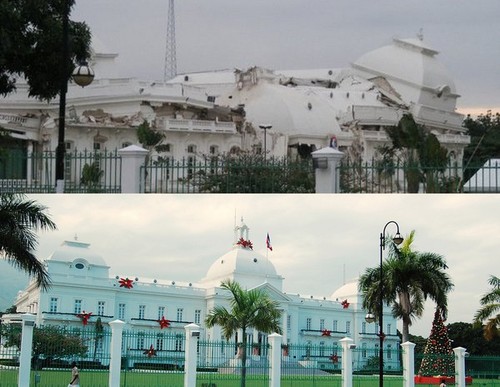Above: The Presidential Palace in Port-au-Prince, after and before. Credit: Lisandro Suero
Here’s how former U.S. President Bill Clinton, in an interview with Esquire, summed up the state of governance in Haiti after last week’s earthquake:
The UN was, in effect, decapitated. The Haitian government was disabled by the destruction of the presidential palace and the president’s offices, and the parliamentary building. There are senior parliamentarians still missing. Members of the cabinet still missing. The prime minister and the president are fine, and they’re setting up shop around the airport. And the U.S. has given them communications equipment.
Haiti’s one small bit of luck at this miserable time is the readiness of the United States, among other countries, to jump to the rescue. The situation of Port-au-Prince at this moment is similar to that of New Orleans in late August and early September 2005: the local authorities were instantly overwhelmed by the disaster, leaving the U.S. federal government to step in.
So what happens when the U.S. federal government itself is the victim of catastrophe and “decapitation”? That’s what we ought to expect in the event of National Planning Scenario #1, a 10-kiloton nuclear ground burst in Washington, DC. With the heart of the federal city in ruins, the U.S. government will have to pull itself up by the bootstraps. So who’s going to lead?
The Haitian case suggests that who lives or dies under these sorts of circumstances is a matter of chance. As mentioned above, President Rene Préval survived the earthquake, although he’s been scarce. Much more damaging to the relief effort was the loss of the top UN officials in Haiti, whose bodies were pulled from the rubble of the Christopher Hotel on Saturday.
So let’s ask, what happens if the President of the U.S. were killed or incapacitated in a citywide disaster of similar magnitude? If this event were to happen tomorrow, Vice President Joe Biden would take over. Unless he had suffered a similar fate, or could not be found — in which case, Speaker of the House Nancy Pelosi would take the oath of office. Unless she, too, could not be found, which brings us to the President of the Senate Pro Tempore, the Honorable Robert C. Byrd. Here’s the gentleman from West Virginia in a picture from last May:
By longstanding Senate tradition, the ceremonial role of President pro Tempore is bestowed upon the member of the majority party with the longest tenure in office. Over the last several years, that’s often been either Sen. Byrd — who has now served longer than any other Senator in the history of the institution — or the late Sen. Strom Thurmond of South Carolina, who celebrated his 100th birthday while in office.
Leadership is pretty important in times of crisis. Given the advanced age and uncertain condition of the most senior Senators, the current setup gives Murphy’s Law too much of an opportunity to parlay a grand national tragedy into a threat to the constitutional form of government itself. One way or another, that really ought to change.



If the capital were ever to be destroyed G forbid, the chances are that there would be a crisis build-up beforehand, giving the leadership some time to prepare. In interstate politics this would be escalatory levels of conflict from diplomatic crisis upward if you go by Herman Kahn. In the case of a pure terrorist attack there should be significant prior intelligence available as terrorists capable of obtaining and delivering a nuclear weapon will have much difficulty in completely concealing their tracks.
By the way, I am not sure that a 10 kiloton scenario in Washington (unless placed next to the Oval Office) is such an inevitable coup de grâce for the President. We all think how Hiroshima was completely obliterated in its entirety by a similar weapon, but Washington DC’s dense steel and concrete would absorb the blast of a ground burst, confining say the completely devastating levels of blast to probably much less than a square mile with minimal heat effects felt not that much beyond that. Fallout could be deadly throughout the city, but key members of the administration should function long enough (provided they are outside of the area of total destruction) to make the most urgent decisions.
As for the point about the ‘age of senators’, this part of the article shows clearly how we live in sad times where the arrogance and fecklessness of youth is idolized at the expense of the wisdom and experience of our venerable aged citizens. In our ‘advanced progressive society’, after the age of 70 you are worthless, just trash it seems.
Just to be clear: the scenario contemplated here is a terrorist attack that occurs without warning. It happens. Just ask anyone on Northwest Airlines 253 on Christmas Day.
The detonation in the written scenario takes place about a block from the White House. Ça suffit. This is what we’re supposed to be prepared for.
And for what it is worth, I do not think that questioning the suitability of a centenarian like Strom Thurmond to assume the presidency in a crisis can sensibly be called a case of idolizing youth. That’s just silly.
Now, perhaps I was being too subtle. It’s certainly not my intention to offend anyone, at least not at this moment, so I will refrain from speculating about which public figures may suffer from what maladies. The larger issue was discussed a little while back at Politico, with reasonable tact, I thought. It ought to go without saying that no one whose powers are failing should be in the line of presidential succession. And as long as we keep the system as it is, we’re going to continue to have one of the most senior people in a rather senior body third in line.
I thought this did end with the Emperor taking power?
He looks frail there but you should see his lightning.